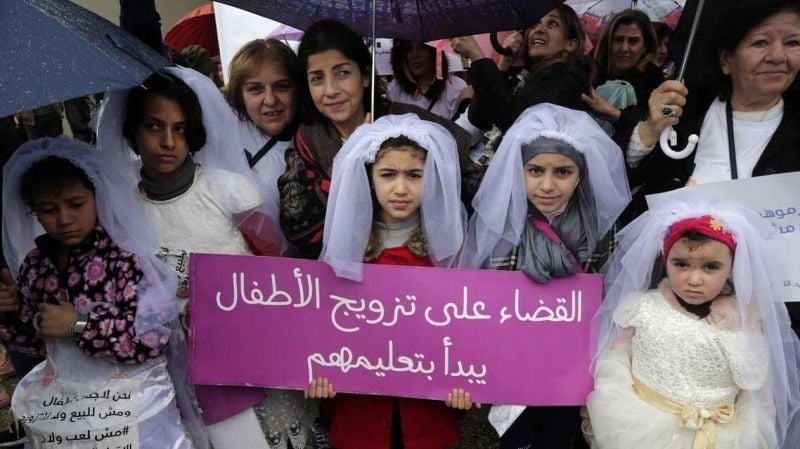
Young Lebanese girls dressed as brides are seen during a march against early marriage in Beirut, March 2, 2019. (AFP)
BEIRUT: It may surprise many to learn that child marriage is still legal across Lebanon, and that children under 18 are still being married.
Campaigners have been active in trying to raise awareness of the risks of early marriage, including health issues, and pushing for a civil law that sets 18 as the minimum age for marriage.
Speaking to L’Orient Today about Save the Children’s (SC) efforts to end child marriage in Lebanon, Shireen Makarem, the organization’s Advocacy and Campaigns Manager, explained that, while the lack of legal protection against child marriage is a significant obstacle to the eradication of child marriage, it is not its ultimate cause. She explained that a variety of mutually reinforcing factors drive children and their families to accept early marriage as a strategy for coping with their vulnerable circumstances.
“The fact that girls are far more likely than boys to marry before reaching adulthood points to gender inequality as a principal driver of child marriage. Discrimination against women and girls aggravates numerous drivers and consequences of early marriage, including education, poverty, protection, and conflict,” Makarem said.
Makarem explained that last week Save the Children and Nabaa, a local NGO, kicked off the national campaign to end child marriage in Lebanon. The campaign coincides with the global campaign “16 Days of Activism against Gender-based Violence” (25 November - 10 December 2021), launched under the global theme set by the UN Secretary-General’s UNiTE campaign: “Orange the World: End Violence against Women Now!”
The campaign includes activities led by children advocating the end of early marriage in Lebanon. One of these activities is a round-table discussion with religious leaders to discuss the crucial role they play in the community.
According to a baseline survey conducted by UNICEF in 2015-2016, “six percent of Lebanese girls are married by the age of 18, twelve percent of Palestinian refugee women are married before they turn 18, and 40.5 percent of Syrian refugee women are also prone to child marriage.” These figures are on the rise, according to Makarem, due to the multiple crises the country is facing.
Legally Married
Despite these troubling statistics, Lebanon has not established a national minimum age for marriage. Marriage in Lebanon is governed by the 15 personal status laws that govern the country’s 18 officially recognized religious groups.
A draft law presented by The Lebanese Women’s Democratic Gathering - RDFL was introduced to Parliament back in 2017. It stated that anyone contributing to or complicit in the marriage of a child will be penalized with fines equal to ten times the minimum wage and prison sentences ranging from six months to two years.
Parliament did not vote on passing this law.
Rasha Wazen, RDFL’s spokesperson, told L’Orient Today that the organization is now working on an amendment to the draft law they previously submitted to present to Parliament, in hopes that MPs will actually vote for it this time.
Wazen explained that the RDFL is also working on ending child marriage in Lebanon through awareness campaigns. Training sessions for young women and men stress the dangers of early marriage and various life skills that fall within the framework of developing youth skills in their own community.
Claudine Aoun Roukoz, President of the National Commission for Lebanese Women (NCLW), told L’Orient Today that efforts to convince parliamentarians are being put forward yet some political parties, including the Future Movement and Hezbollah, are against passing this law.
L’Orient Today reached out to MP Rola Tabsh (Future Movement/Beirut II), seeking clarification on Future’s rejection of the law, but she refused to comment.
Roukoz said that, while the law might take time to pass, “other efforts are now being pursued in parallel, with UNICEF and NCLW currently collaborating on a campaign designed to make prevention and active rejection of child marriage everyone’s responsibility.”
Human Rights and International law
According to a recent report by the Human Rights Watch, every year 12 million girls under age 18 marry around the world. Married girls are more likely to experience domestic violence than women who marry as adults are more likely to face serious health risks, including death, due to early and closely spaced pregnancies.
Lebanon has signed both the Convention on the Rights of the Child and the Convention on the Elimination of All Forms of Discrimination against Women – international agreements that expressly prohibit or have been construed to prohibit child marriage. State parties have also been urged to set the minimum age for marriage at 18 and to take steps to prevent child marriage, according to UN bodies overseeing the conventions’ implementation.
“It is beyond shameful that parliament has not yet passed laws raising the age of marriage and protecting girls from the dire lifelong consequences of child marriage. Girls who marry early are more likely to leave school and are at heightened risk of marital rape, domestic violence, poor access to decent work, exploitation, and a range of health problems due to early childbearing,” Aya Majzoub, the Lebanon researcher at Human Rights Watch told L’Orient Today.
“Lebanon lags far behind other countries in the region who have made significant advances in protecting girls from the horrors of child marriage.”
A number of other Middle Eastern and North African countries have made 18 the compulsory minimum age for marriage, with some granting exceptions in extraordinary circumstances. Algeria, Egypt, Iraq, Libya, Tunisia, Morocco, Jordan, Oman, and the United Arab Emirates are among these countries.
Clarification: A previous version of this article said that RDFL is preparing to submit a new draft law to set the minimum marriage age. They are working on an amendment to the draft law they previously submitted.